Handling Emotions After Your Child
Has Been Diagnosed with Autism
I want to take the time to personally reach out – have the heart-to-heart with you.❤️
The reason is because if your child was just diagnosed with autism, you’re likely feeling an overwhelming amount of emotions.🎢
Let me tell you how I felt:
I was told my baby had autism – a lifelong disability, for which there was no cure. He was a severe case and would likely never talk. He would likely need me for the rest of his life, as he would likely not be able to thrive on his own.
I felt as though the world swallowed me up and then spit me back out.
On one hand, I felt relieved that everything he was doing had a name and it could be explained. It meant that others met this criteria too so we weren’t alone.
On the other hand, I felt like his whole life had been determined in this one moment. Now he was “autism”, and this would dictate his life forever. Plus, I knew nothing about it.
If you are at this spot, I want to share with you what I wish someone could’ve told me years ago:
- Autism isn’t terminal. Nothing is over. In fact, the story is just beginning. This diagnosis doesn’t decide what your child’s whole life will look like. In fact, your child right now will not be the same child you have in a year. Most of what people predict for your future will be wrong anyway. My son talks nonstop and is way more independent than I ever was at his age. The diagnosis doesn’t mean the whole story is already written, it just means you may write your story with crayon instead of pencil.
- It’s not a solo journey. There’s the old phrase “it takes a village to raise a child”. It’s true. I think our culture loves to put us against one another and make us want to seem like the super mom who has it way more together than any other. The truth is, we all flop. We’re only human. Be open to learning from others, willing to ignore judgement and unwavering in trusting your gut. Get as much support and info as you can, but remember that you have the super spidey sense with your own child.
- You’re the secret sauce. You’ll be recommended for therapies and they will be great, but what will help your child most is you being knowledgeable and empowered. It’ll not only help you understand the therapy and ensure that it’s going as it should, but it’ll give you the ability to parent consciously. The “What to expect when you’re expecting” authors didn’t add a chapter about this level of parenting. The way you guide a child who is on the spectrum may need to be different than how you’d guide a child who is not – and this makes all the difference. It’s the make or break. A child who has a great attachment to their parents will undoubtedly progress. It’s why I created my business to help parents achieve this. I noticed that when my son saw that I knew how to interact with him and reach him at his level, he was much more open to learning from me. This is my mission in life – to help you establish this bond.
- It’s okay to mourn the life you thought your child would have. When you’re a parent, you want your child to feel no pain and have a totally happy life. I’m really happy to tell you that having a happy life is not only still possible, but you are able to encourage it. Love your child for who he is, parent consciously and celebrate every single step. I guarantee it will lead to a joyful life.
- You got this. This isn’t just a cliche. You are really what your child needs most, and you’re packed full of all the things he needs. It’s biologically sound. You contain everything your child needs. All the other stuff can be learned. You can learn how to parent a child who learns differently. You can learn how to keep therapy goals active at home. All of that is just part of the journey.
If you would like to be a part of our free community for support and where I educate parents on Autism, join our Facebook Group ABA Parent Masters.
or you can schedule a 1:1 call with me where I’d be happy to help you every step of the way.



Leave A Comment